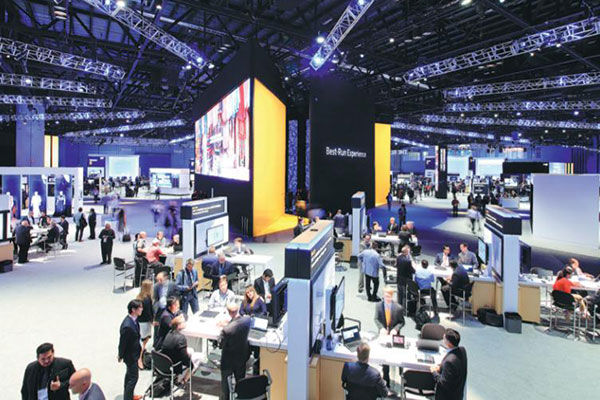SAP enables digital transformation
China Daily Updated: May 24, 2019

Please use three words to describe China's changes in the past 40 years.
Growth, transformation, globalization. China has successfully managed the world's fastest growth trajectory in human history. It has grown at a strong pace for decades to become the world's second-largest economy.
China has successfully transformed the economy structurally as well. From heavy industry to high-tech, China is globally competitive across the range. The country has emerged not only as a global innovation powerhouse, but a true global leader in many respects.
What are the biggest achievements in China since the introduction of the reform and opening-up policy 40 years ago?
The reform and opening-up policy provided an unprecedented opportunity for Chinese enterprises to develop quickly and leapfrog other markets. The introduction of the policy four decades ago unleashed energy across the economy, and forward-looking companies eagerly adopted information technology. They embraced global best practices to optimize their business processes, and integrated into the global digital economic system.
China's entry into the World Trade Organization in 2001 further accelerated the digitalization and globalization of domestic businesses. It began to put more emphasis on high-quality development driven by innovation.
The introduction of the Belt and Road Initiative and smart manufacturing are calling Chinese businesses to put digital transformation at the center of their development strategies.
With the growth of the internet, Chinese entrepreneurs and business leaders have created amazing companies that are now giants, topping the list of the Fortune 500.
While large enterprises are making rapid and significant strides in terms of digital transformation, there are smaller companies that are innovating in advanced technologies, setting China on a course for continued leadership.
What's the biggest challenge China faces today and how can the country overcome it?
President Xi Jinping's new development concepts are designed to address the challenges China faces. I deeply admire the way the five concepts, "innovative, coordinated, green, open and shared," are clear and provide a blueprint for the country for the coming decades.
It is a great example of long-term thinking at strategic and executional levels. One of the biggest challenges that all countries, including China, face today is to reduce negative environmental impacts while sustaining economic growth.
China's role as a change-maker in global technology also has a direct impact on environmental sustainability. The government is committed to policies ensuring that its accelerated development takes full consideration of the environment.
How has your company benefited from the country's reform and opening-up policy?
The year 1992 was a historic milestone in China's reform and opening-up. This was the same year SAP won our first-ever Chinese mainland customer. After that, SAP established its China business in 1995.
Today, China is one of our top five markets globally, and we consider China our second home. We are the market leader in enterprise applications software and one of the fastest-growing cloud providers.
For the past 20 years we have been on a journey with our Chinese customers to help them create value for their organizations by applying technology to solve some of their most complex business challenges. After establishing ourselves in China, we quickly expanded our footprint with operations in more than 10 cities.
Having aligned our business strategy with China's development agenda, SAP has achieved tremendous growth through enabling the digital transformation of our customers.
Has competition intensified between your company and Chinese companies?
I am deeply impressed by the fact that more than one-fifth of the Fortune 500 companies are Chinese enterprises, the majority of which are SAP customers. We are extremely proud to be a technology partner with our Chinese customers and to help them enable their digital transformation. In China, SAP has been investing and building a broad business network with hundreds of local partners, including Lenovo, Huawei, Alibaba Cloud and China Telecom, just to name a few. We collaborate with local companies in a complementary approach. By combining our strengths, we co-innovate solutions that meet the unique needs of Chinese customers.
Apart from economic development, what progress in other fields have you witnessed in China in the past 40 years?
I am very impressed with young people in China. Whenever I visit, I am so impressed with their ability to think innovatively, dream big and be global, while still being proud of China. There are so many innovative young minds with determination and enthusiasm, who are well poised to contribute to the technology industry, both in China and abroad.
SAP has an active university alliance program enabling close to 1 million students in more than 300 educational institutions across China to integrate the latest SAP technologies into academic teaching and research.
How do you view China's role in the world today?
China clearly is a strong power economically and politically. After four decades of development, China has also established itself as a global innovation leader.
Around the world, China is engaging in constructive development and dialogue, and is asserting its influence to benefit not only the country, but also the world at large.
What will be the country's "calling card" in the future?
Today, two out of five of the world's unicorns - startups valued at $1 billion or more - are from China, which really demonstrates the innovative power and adaptive speed of Chinese companies.
The country has made significant advances in technology in areas such as supercomputing and artificial intelligence. This has helped to propel its economic growth and raised the bar for innovation across the world.
I think China's calling card in the coming decades will continue to be a strong spirit and capability for innovation to make China and the world a better place.
![]()





